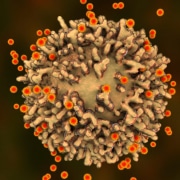Innatoss and Erasmus MC enter into new cooperation
Researchers from Erasmus MC and Innatoss Laboratories in Oss will develop a specific and sensitive test to determine exposure to SARS-CoV-2. They will focus on the response of T cells while existing tests are mainly based on antibody detection.
How do you determine whether someone has been infected with the SARS-CoV-2 coronavirus? Currently, this is mainly done by measuring antibodies in blood. Over the next two years, researchers from Erasmus MC and Innatoss Laboratories together will study another important player in the immune system; the T cells. T cells are white blood cells that clean up virus-infected cells and ensure a long-lasting memory of the immune system.
Supplement to the antibody test
The shared research project should lead to a new corona test, based on the detection of specific T cells. This new test will complement existing antibody tests. “People who have had a mild infection sometimes don’t have high enough levels of antibodies to measure. There are indications, however, that T cells can be detected in those people,” says virologist Rory de Vries, who works at the Viroscience department of Erasmus MC.
Such a new test to measure immune response can be used to determine whether someone has previously been infected with the coronavirus. It is possible that such a test can also be used to determine whether someone is protected from future infection. Anja Garritsen of Innatoss Laboratories sees an immediate relevance of such a T-cell test for diagnostics. “A test that can detect SARS-CoV-2 specific T cells will complete the testing options for Covid-19. We can then detect the RNA and protein of the virus during infection, and both antibodies and the T cell response after infection. There is a real need for this. ”
Developing a test that detects coronavirus-specific T cells is not an easy endeavour. In addition to SARS-CoV-2, there are several closely related coronaviruses that cause mild colds in every winter season. Because these common cold coronaviruses are very similar to SARS-CoV-2, it is sometimes not possible for T cells to tell the difference between them. This is what is called cross-reactivity.
Cross-reactivity
A test to detect T cells against the SARS-CoV-2 coronavirus will therefore have to be very sensitive and specific. To achieve this, the researchers fall back on the knowledge within Erasmus MC. De Vries already has experience in measuring the response of T cells in Covid-19 patients and also observed cross-reactivity in these patients.
De Vries: “To distinguish this new test from other T-cell tests that are currently under development, we will focus on specific pieces of SARS-CoV-2 that are not found in the common cold coronaviruses. Thereby, we prevent that someone who has not yet had Covid-19 would get a (false) positive result”.
Vaccination
In addition to a T-cell test for the SARS-CoV-2 coronavirus, this research project will also provide new insights into the role of T cells in the immune response. This can, for instance, also be very useful for understanding the immune response induced by vaccination. De Vries: “We do not know yet how long the vaccines will provide protection. With our research, focussing both on infected and vaccinated individuals, we hope to determine whether and which T cells are involved in protecting against Covid-19.”
The collaboration project is co-financed with a PPP allowance made available by Health ~ Holland, Top Sector Life Sciences & Health, to stimulate public-private partnerships.


